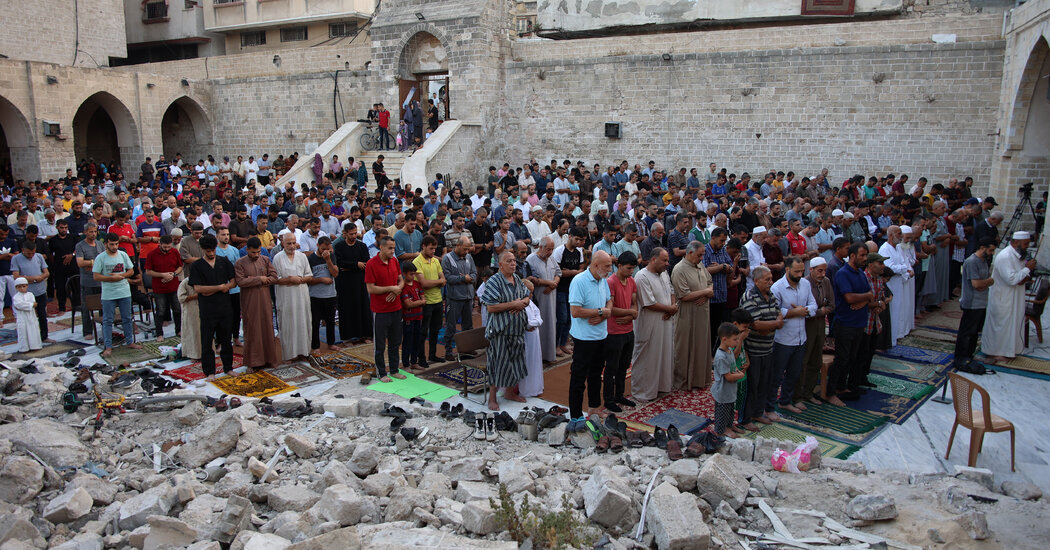After eight devastating months of war, Muslims in Gaza on Sunday will mark a somber Eid al-Adha, a major religious holiday usually celebrated by sharing meat among friends, family and the needy.
Adha means sacrifice, and the ritual killing of a sheep, goat or cow on the day is meant as a symbol of the prophet Abraham’s willingness to sacrifice his son. But this year, nearly everyone in Gaza is needy. Hunger has gripped the Palestinian territory as Israel has unleashed an eight-month military offensive on the enclave and severely restricted what is allowed to enter, including humanitarian aid.
Many do not feel like celebrating.
“There won’t be any Eid, nor any Eid atmosphere,” said Zaina Kamuni, who was living with her family in a tent on a sandy expanse of land in southern Gaza called Al-Mawasi. “I haven’t eaten any meat in five months.”
“It will be a day like any other day, just like Eid al-Fitr,” she added, referring to the other major Muslim holiday, which Gazans observed more than two months ago under the same conditions.
Since the war began on Oct. 7 after the Hamas-led attack on Israel that Israel estimates killed 1,200 people, Gazans have endured intense regular bombardments and deprivation. More than 37,000 people have been killed, according to Gazan health authorities, and hunger is rampant.
“With continued restrictions to humanitarian access, people in #Gaza continue to face desperate levels of hunger,” UNRWA, the United Nations agency for Palestinian refugees, posted on social media on Saturday, adding that more than 50,000 children require treatment for acute malnutrition.
On Sunday, the Israeli military announced a daily pause in military operations near a southern Gaza border crossing in order to allow more aid to enter the territory, although it was not immediately clear whether many more supplies would get in. The U.N. World Food Program warned this week that southern Gaza could soon see the catastrophic levels of hunger previously experienced by Gazans in the north of the territory.
Many Gazans have clung to hope amid reports of negotiations and proposed cease-fire deals between Israel and Hamas. But the passing of each holiday — including Christmas and Easter for Gaza’s small Christian population — is a reminder of how entrenched this war has become.
In past years, Adnan Abdul Aziz, 53, who is living in Deir al Balah, in central Gaza, had been able to buy a lamb and slaughter it on Eid. On the morning of Eid, he and his family would eat lamb liver for breakfast and for lunch would make a traditional Palestinian dish with the meat. They would give the rest to family and friends and to the needy.
Now, because of the lack of electricity and higher costs at markets, Mr. Abdul Aziz must buy food daily, depending on what is available and what he can afford. But the feasting is not the only thing he will miss this year, he said.
“There are the family visits and gatherings, giving money to the kids, buying new clothes for everyone, making sweets, doing Eid prayers,” he said. “None of this is doable this year. Everyone is sad and has lost someone or something.”
Aya Ali Adwan, 26, got engaged to be married before the war began. Her wedding, which had been set for February, was postponed, another celebration disrupted by the conflict.
Originally from northern Gaza, she and her family have been forced to flee eight times during the war. They are now sheltering in a cramped tent in Deir al Balah, where the heat has been approaching 95 degrees Fahrenheit, making the tent unbearably hot.
“My spirits are shattered,” she said. “We should be busy with preparations for Eid, like baking cookies and the usual tasks such as cleaning the house and buying clothes, like any Palestinian family before Eid. But this year, there is nothing.”
Many relatives who would have visited their home during Eid have been killed in the war, she said.
“Right now, the only thing we need is to feel safe, even though we lack everything,” she said. “The only thing we need is for the war to stop and for us to return to our homes.”
Ameera Harouda and Bilal Shbair contributed reporting.
